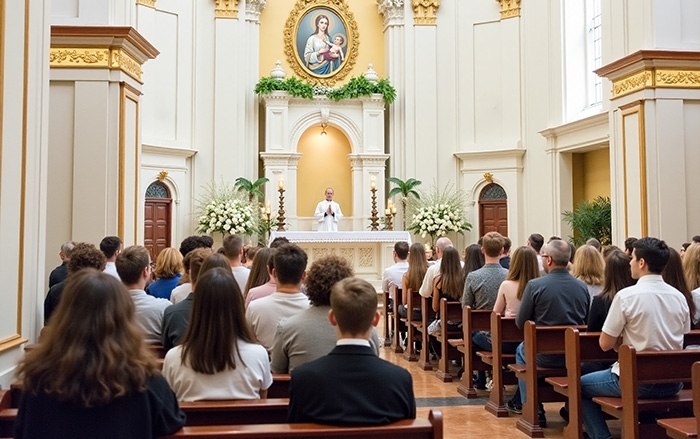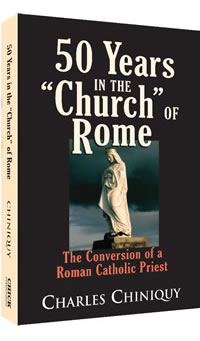Longing for Hope — Looking in the Wrong Place

Across the world, something remarkable is happening. People who once turned away from church are now searching again — longing for stability, meaning, and spiritual truth. On the surface, this seems like good news. But the real question is — which God are they finding?
Recent reports tell of young adults flooding into Catholic cathedrals, of LGBTQ groups marching to the Vatican, and of entire generations looking to ancient rituals to fill the emptiness of their hearts.
In a recent report from The Washington Post, thousands of LGBTQ-identifying Catholics joined a “Jubilee Pilgrimage” to Rome this summer, walking through the Holy Door of St. Peter’s Basilica with the pope’s public blessing. Organizers said it marked “a new era of inclusion.” One pilgrim told reporters she “felt like [she] was touching the hand of God.”
Another event — the International Assembly of LGBTQ Catholics — drew more than a thousand attendees to the Vatican. Banners reading “Faithful and Proud” filled the streets as participants celebrated what they called their “long-awaited welcome” into the Church. “We finally feel seen,” said one Italian participant. “The Church has opened her doors to us.”
Such scenes underscore Rome’s new modern stance: affirmation has replaced admonition. Even in the Catholic church, what was once called sin is now being embraced as identity.
Meanwhile, another unexpected wave of seekers is turning toward Rome — Gen Z (aged 13-28).
Cardinal Timothy Dolan described the recent surge of young people attending Mass as “a youthful leap of faith.” He said he’s seen “more people attending Mass” and “a definite uptick in people freely choosing to become Catholic or to return to church.”
The Cardinal cited research from Harvard University showing that between 2022 and 2023, the number of Gen Z Americans identifying as Catholic rose by six percent — even as most forms of religious affiliation continue to decline.
In New York, Dolan observed that young adults are filling confession lines and adoration chapels. “I’m always impressed by the number of young people there — not just as tourists, but in line for confession, in the Lady Chapel for adoration, or attending one of the seven daily Masses,” he wrote.
He called the movement a “welcome development,” crediting the examples of modern Catholic figures like Carlo Acutis and Pier Giorgio Frassati — both young Italians whose canonizations have inspired youth across the world. This is blasphemy because Rome encourages prayer to these “saints” instead of prayer to God. It is baptized paganism where there are many gods you can appeal to for help.
While the search for truth is encouraging, these young seekers are not finding faith in Christ but solace in ceremony and rituals. Their longing for hope is real, but their destination is entirely wrong.
Everywhere we look, the human heart is crying out for truth, comfort, and hope. After years of confusion, moral collapse, and broken identity, people want truth again. They want forgiveness. They want peace with God.
But in turning to Rome, they’re finding counterfeit comfort. Catholicism promises the comfort of belonging without the truth or salvation and the hope of new birth. Seekers are told that grace comes through the sacraments, that forgiveness is mediated through confession, that assurance is presumptuous, and that salvation comes partly by their own effort.
The world is starving for hope. Instead of getting filled, they are drawn into counterfeit redemption that will never satisfy.
The world is listening. People are asking questions— about truth, eternity, and God. It’s never been easier to start a conversation that matters. That’s why it’s vital that we are ready to share the gospel wherever we go.
Whether you have time for a conversation or can only spare a minute on your way to work, handing out a gospel tract might be the best thing you can do to share the hope of Christ. These simple tracts can go where we can’t and speak long after we’re gone.
So wherever you go — to work, the store, the gas pump — take a few Chick tracts with you. Give them to all who will take them. You never know whose searching heart might be ready to find the truth at last.
- See more articles on related topics:
- Catholicism
- False Religions
- Evangelism
Products of interest:
-

Last Rites
When this Catholic dies, he learns that his church couldn't save him. -

Are Roman Catholics Christians?
Show Catholics that neither their good works nor their religion can save them. -

Is There Another Christ?
Have you ever been lied to? Millions have, trusting in "another Christ" to save them. The gospel for Roman Catholics. -

Alberto
32-PAGE, FULL COLOR COMIC BOOK - Alberto Series Part 1 - Here is how Alberto, as a Jesuit, helped destroy churches and ministries. But as he read the Scriptures, he saw that Catholicism couldn’t save.
-

50 Years in the Church of Rome
368 pages
This classic work shows how this priest began to question Catholic teachings until he became saved, and led his entire parish to salvation. -

Answers To My Catholic Friends
64 pages
A gentle witness you can give Catholics that deals with venerating images, purgatory, where popes go when they die, and more. -

Babylon Religion
224 pages
Learn how a Babylonian goddess became the Virgin Mary. An easy-to-read history of Catholicism's Babylonian origin.
